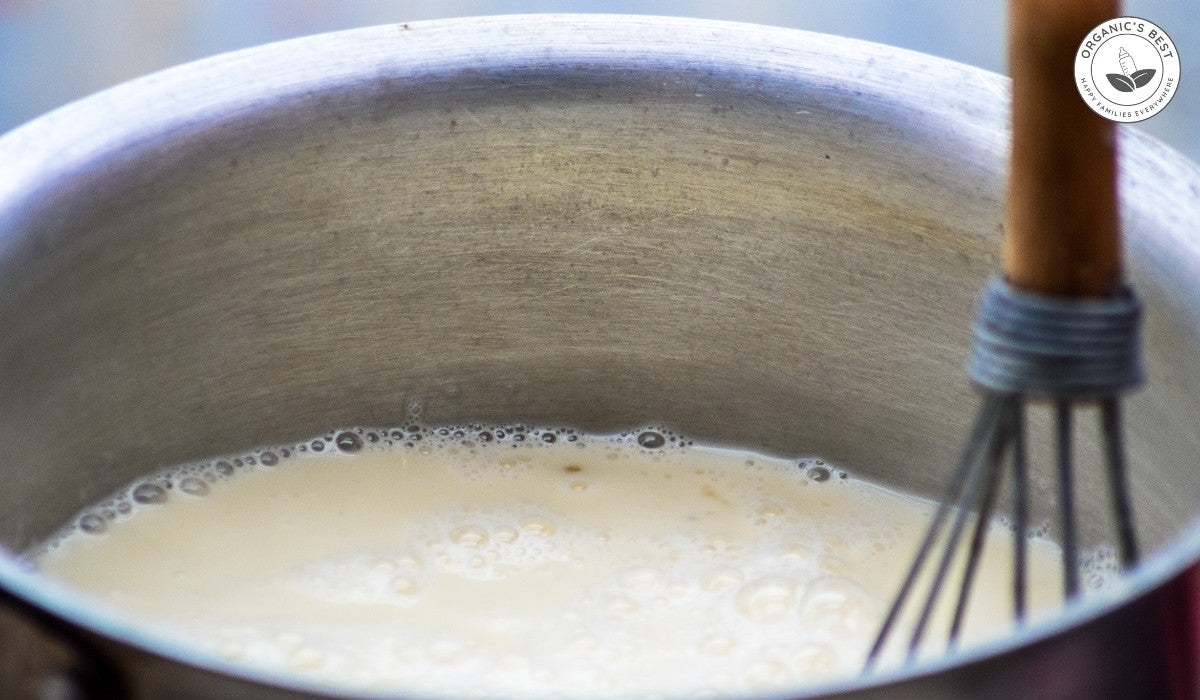Click to Get 2 FREE Boxes/Cans
Only New Customers! Click HERE to Get 2 Extra Boxes/Cans for Free With Your First Order.
BABY FORMULA
Offering new parents top-quality European infant formula from renowned brands like HiPP, Holle, Kendamil, and more. If you’re uncertain about which product to choose, our Formula Finder can help you make the best decision for your baby.
Baby Food
Offering new parents a premium selection of European baby foods, including jars, pouches, cereals, and snacks from esteemed brands like HiPP and Holle.
Why Homemade Baby Formula is Riskier Than You May Think
by Agustina Fernandez January 23, 2024 6 min read

In the quest for the most natural, wholesome foods for our babies, some paths are best left unexplored.
One such path is homemade baby formula. The thought of creating your own baby formula from scratch might feel organic and empowering, especially during infant formula shortages. But, the risks attached to homemade baby formula far outweigh any perceived benefits.
In this guide, we'll delve deep into the surprising hazards of homemade baby formula and offer safer alternatives for feeding your little one!
Table of contents
What is Homemade Infant Formula?

Homemade formula refers to a DIY alternative to commercial infant formulas that are readily available in stores. This practice was common decades ago and involves using various ingredients, often sourced from the kitchen or local markets, to create a mixture that is intended to provide infants with a substitute for breast milk.
This approach is often born out of the desire to offer a more "natural" and "wholesome" option for feeding babies but has also been used by some parents in the case of a baby formula shortage when it's very difficult to find formula at all. So the question is, is homemade baby formula safe?
The answer is no, it's not safe. While it can seem appealing to have complete control over the ingredients and know exactly what goes into your child's diet, it's important to emphasize the safety issues associated with homemade baby formula, which we explore in depth in our next section.
Potential Risks of Homemade Baby Formula Recipes
Let's take a look at some of the most common risks.

Contamination issues 🦠
The risk of contamination is a significant concern when crafting homemade baby formula. Unlike commercially produced formulas, which are strictly regulated, homemade formula mixtures can be susceptible to bacterial growth and other forms of contamination.
A 2020 study analyzing 144 homemade formula recipes found that nearly half of them included ingredients that could potentially cause foodborne illnesses, which could result in serious health problems for your little one.
Nutrient imbalances ⚖️
Homemade infant formula recipes often lack critical nutrients needed for healthy growth, such as vitamins and iron, as emphasized by the American Academy of Pediatrics (AAP), creating risks to infant health. Some recipes contain potentially harmful ingredients like raw milk or almond milk. Moreover, the presence of nutrient excesses of certain ingredients, such as too much salt, can strain an infant's delicate organs and threaten your baby's health.
Real-life cases have surfaced where babies who were fed homemade infant formula faced malnutrition, failure to thrive, and even life-threatening complications like rickets and anemia, often winding up in the emergency room.
These stories serve as poignant reminders of the unintended harm that well-meaning parents might inadvertently cause by veering away from established nutritional guidelines to make their own infant formula.
Serious problems like nutrient deficiencies, low calcium, and inadequate amounts of vital nutrients, among other potential problems, can be avoided by sticking to feeding your little one commercial infant formula if your child doesn't exclusively take breastmilk.
Understanding Commercial Baby Formulas: Safety and Standards
Infant nutrition is a complex science that requires precise formulations to meet your baby's nutritional needs adequately; any of the homemade baby formula recipes floating around on the internet simply won't cut it.
Rigorous Standards of Commercial Baby Formulas
Commercial formulas undergo rigorous research, testing, and regulation to ensure they provide the essential balance of nutrients crucial for a baby's development. Notably, European organic formulas have some different and more strict regulations for infant formula than those set by the United States, emphasizing the exclusion of genetically modified organisms and corn syrup and rules for minimizing contaminant traces.
Learn More: Best Formula Without Corn Syrup
Some commercial formulas even adhere to more stringent private organic certifications, such as Demeter or Bioland. These certifications go beyond organic requirements, incorporating biodynamic farming principles and sustainable practices. Organic certifications are highlighted on the infant formula label to help parents identify these products.
Straying from these meticulously designed formulas, even with good intentions, can result in severe nutritional imbalances, deficiencies, and potential health complications for your little one.
Nutritional Balance in Commercial Formulas
One of the remarkable aspects of commercial baby formulas is their ability to emulate the nutrient profile of breast milk. These formulas are carefully composed to provide an appropriate balance of proteins, carbohydrates, fats, vitamins, and minerals that replicate breast milk.
European commercial formulas, which come in multiple varieties such as goat's milk formula, cow's milk formula, and milk substitutes such as rice protein for special dietary needs, are designed to cater to specific age ranges.
This ensures that infants receive the right macro and micronutrients at each stage of their development. The precise ratios of nutrients are based on extensive research and are continually refined to align with the latest scientific understanding of infant nutrition.
Commercial formulas are a result of collaboration between pediatricians, nutritionists, and food scientists. This collaborative approach ensures that babies receive the best possible nutrition outside of breastfeeding.
Debunking Myths Around Homemade Formula
There are prevalent misconceptions that making your own formula can be a healthier or safer alternative to commercially available options. However, it's important to confront these misguided notions and shed light on the potential risks associated with such beliefs.
Some common myths surrounding homemade infant formula are:
-
Natural and Organic Misconception: Assuming homemade formulas are more natural and organic overlooks the intricate nutritional balance in commercial options and the risks of nutrient imbalances. If you prefer to offer your child an organic diet, there are plenty of commercial organic formulas available for purchase.
-
Ingredient Control Illusion: Believing recognizable ingredients offer better control ignores the scientific expertise required to balance nutrients properly in infant formulas. It also overlooks the stringent safety checks and quality control measures that manufactured baby formula is subjected to.
-
Avoiding Additives and Preservatives: Overlooking the regulated safety of additives and preservatives in commercial formulas neglects the risks of bacterial growth and contamination in homemade versions.
-
Personalized Nutrition Fallacy: Assuming homemade formulas allow for personalized nutrition disregards the extensively researched and scientifically established infant nutritional guidelines.
The fact is that leading pediatric experts and regulatory bodies such as the FDA strongly advise against creating your own infant formula for the reasons listed above and the dangers discussed earlier.
Alternatives to Homemade Baby Formula

Homemade baby formula is off the table due to its associated risks, but there are several tried-and-true alternatives that prioritize infant health and nutrition:
-
Breastfeeding, when possible, remains your best choice, as breast milk offers a unique blend of nutrients that adapt to a baby's changing needs.
-
For women who are unable or choose not to breastfeed, commercially available infant formulas based on goat milk, cow milk, or dairy alternatives are meticulously formulated to meet these needs and are supported by extensive research and testing.
-
In situations where a mother's own milk isn't available, screened and pasteurized donor milk can provide a safe and beneficial alternative.
Conclusion: Is Homemade baby formula safe?
The safety and health of our little ones must always come first. It's paramount to recognize the scientific complexity behind infant nutrition and the carefully formulated options available.
Instead of risking uncharted paths with homemade formulas, we encourage parents to choose the safer alternatives that have been meticulously designed to meet infants' precise needs!
More Helpful Formula Guides!
- Best Formula for Colic
- Best Formula for Sensitive Stomachs
- A Deep Dive into Sensitive Baby Formula
- The Best Hypoallergenic Baby Formulas
- Best Formula for Breastfed Babies 2025 Guide
Disclaimer:
Please be aware that this information is based on general trends in babies, and it is not medical advice. Your doctor should be your first source of information and advice when considering any changes to your child’s formula and when choosing your child’s formula. Always consult your pediatrician before making any decisions about your child’s diet or if you notice any changes in your child. Breastfeeding is the best nutrition for your baby because breast milk provides your child with all the essential nutrients they need for growth and development. Please consult your pediatrician if your child requires supplemental feeding. |
Agustina Fernandez
Dr. Agustina Fernandez earned her medical degree from the prestigious Universidad Nacional de Córdoba, Argentina. With a deep-rooted passion for pediatrics, Dr. Fernandez is currently on the path to specializing in children's healthcare. Recently, she has delved into the vital field of infant nutrition. Her research interests include breastfeeding, infant formula, and baby food in little ones’ formative years. Dr. Fernandez's commitment to this area of study underscores her dedication to ensuring the health and well-being of children from their earliest days.
1 Response
Leave a comment
Comments will be approved before showing up.
Also in Organic Infant Nutrition and Health Blog

Does Your Kid Need More Vitamin D in Winter?
by Agustina Fernandez January 28, 2026 7 min read
Read More
Influenza in Babies: What to Watch for Flu Symptoms in Kids
by Agustina Fernandez January 20, 2026 9 min read
Read More
Infant Botulism: Symptoms, Causes, and Safety Tips for Parents
by Agustina Fernandez January 13, 2026 8 min read
Read More
Reviewed by Dr. Bardha Qerimi, MD
-

Dr. Bardha Qerimi: Medical Reviewer of Organic's Best Blog
Dr. Bardha Qerimi completed her medical studies at the University of Prishtina in Kosovo, where she began her journey into the field of medicine. She has since developed a career in medical research, contributing to projects with notable organizations, including the World Health Organization (WHO).

Kay
January 24, 2024
Be careful about using donor milk these days as mrna is found in trace amounts in breast milk. Additionally, if you are recently vaccinated its best to wait 2 weeks before feeding your baby.